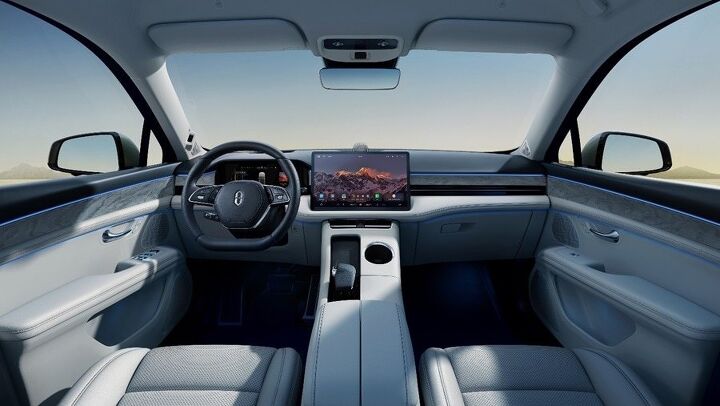China's Huawei Establishes ‘Smart Car’ Unit With Changan Auto

Huawei has announced it will continue becoming intertwined with the automotive sector after signing onto a joint venture with Chinese state-owned carmaker Changan Automobile. The telecommunications giant has established Shenzhen Yinwang Intelligent Technology with a registered capital of 1 billion yuan ($140 million USD) and a focus on smart car equipment manufacturing, artificial intelligence system integration services, and AI software development.
According to the South China Morning Post, the new unit is wholly owned by Huawei and will be used to help transfer technology between the phone company and Changan Auto. The telecom firm previously said that the plan would be to “integrate the core technologies and resources of [Huawei’s] smart car solutions into the new company.”
The firm declined to comment on the relationship between the new entity and the agreement it signed with Changan in November.
From the South China Morning Post:
In November, Richard Yu Chengdong, CEO of Huawei’s consumer business group and chairman of its Intelligent Automotive Solution business unit, called on Chinese carmakers Seres Group, Chery Automobile, JAC Motors and BAIC Motor to take an equity stake in the Huawei-Changan JV.
All four of these companies — generally considered smaller carmakers in the country — currently partner with Huawei to develop and sell new brands under the so-called Huawei Select model, through which the smartphone giant collaborates closely with companies on everything from product design to sales. These brands include Aito with Seres and Luxeed with Chery.
While this arrangement yields roughly the same level of importance as if Microsoft or Apple had a joint partnership to develop automotive tech, it has to be said that the outlet is known for over-hyping regional businesses and effectively serves as propaganda for the Chinese government. However, one could make similar arguments about select Western outlets and bias certainly doesn’t mean the reporting defaults as false. Still, particular attention should always be given to framing of any article.
Huawei has been getting involved with loads of industries in a bid to see its technology become the foundation of smart devices that leverage connectivity to monopolize user data, create new revenue streams, and provide additional opportunities for government surveillance. We’ve seen something similar taking place in Western markets as “smart devices” became commonplace and automotive connectivity was standardized. But Huawei has been sanctioned by the United States, meaning whatever tech it develops for cars likely won’t be making it to our shores.
Changan has also said that the telecom giant had promised not to manufacture cars on its own while the joint venture was in effect. Most of the work will be focused on developing new cockpits using novel interfaces (likely touch screens and augmented reality displays) that take into account artificial intelligence and voice command. The duo are reportedly still in discussions as to exactly what that entails. But they’re already making room for other automakers to jump aboard the program — which is currently using the working title “Newcool.”
With the Chinese government encouraging all automakers to get under the umbrella, they’re effectively obligated to jump aboard the program. A large portion of domestic brands already have working partnerships with Huawei and there seems to be a state-backed push for that trend to continue.
[Image: Huawei]
Become a TTAC insider. Get the latest news, features, TTAC takes, and everything else that gets to the truth about cars first by subscribing to our newsletter.

A staunch consumer advocate tracking industry trends and regulation. Before joining TTAC, Matt spent a decade working for marketing and research firms based in NYC. Clients included several of the world’s largest automakers, global tire brands, and aftermarket part suppliers. Dissatisfied with the corporate world and resentful of having to wear suits everyday, he pivoted to writing about cars. Since then, that man has become an ardent supporter of the right-to-repair movement, been interviewed on the auto industry by national radio broadcasts, driven more rental cars than anyone ever should, participated in amateur rallying events, and received the requisite minimum training as sanctioned by the SCCA. Handy with a wrench, Matt grew up surrounded by Detroit auto workers and managed to get a pizza delivery job before he was legally eligible. He later found himself driving box trucks through Manhattan, guaranteeing future sympathy for actual truckers. He continues to conduct research pertaining to the automotive sector as an independent contractor and has since moved back to his native Michigan, closer to where the cars are born. A contrarian, Matt claims to prefer understeer — stating that front and all-wheel drive vehicles cater best to his driving style.
More by Matt Posky
Latest Car Reviews
Read moreLatest Product Reviews
Read moreRecent Comments
- Varezhka I have still yet to see a Malibu on the road that didn't have a rental sticker. So yeah, GM probably lost money on every one they sold but kept it to boost their CAFE numbers.I'm personally happy that I no longer have to dread being "upgraded" to a Maxima or a Malibu anymore. And thankfully Altima is also on its way out.
- Tassos Under incompetent, affirmative action hire Mary Barra, GM has been shooting itself in the foot on a daily basis.Whether the Malibu cancellation has been one of these shootings is NOT obvious at all.GM should be run as a PROFITABLE BUSINESS and NOT as an outfit that satisfies everybody and his mother in law's pet preferences.IF the Malibu was UNPROFITABLE, it SHOULD be canceled.More generally, if its SEGMENT is Unprofitable, and HALF the makers cancel their midsize sedans, not only will it lead to the SURVIVAL OF THE FITTEST ones, but the survivors will obviously be more profitable if the LOSERS were kept being produced and the SMALL PIE of midsize sedans would yield slim pickings for every participant.SO NO, I APPROVE of the demise of the unprofitable Malibu, and hope Nissan does the same to the Altima, Hyundai with the SOnata, Mazda with the Mazda 6, and as many others as it takes to make the REMAINING players, like the Excellent, sporty Accord and the Bulletproof Reliable, cheap to maintain CAMRY, more profitable and affordable.
- GregLocock Car companies can only really sell cars that people who are new car buyers will pay a profitable price for. As it turns out fewer and fewer new car buyers want sedans. Large sedans can be nice to drive, certainly, but the number of new car buyers (the only ones that matter in this discussion) are prepared to sacrifice steering and handling for more obvious things like passenger and cargo space, or even some attempt at off roading. We know US new car buyers don't really care about handling because they fell for FWD in large cars.
- Slavuta Why is everybody sweating? Like sedans? - go buy one. Better - 2. Let CRV/RAV rust on the dealer lot. I have 3 sedans on the driveway. My neighbor - 2. Neighbors on each of our other side - 8 SUVs.
- Theflyersfan With sedans, especially, I wonder how many of those sales are to rental fleets. With the exception of the Civic and Accord, there are still rows of sedans mixed in with the RAV4s at every airport rental lot. I doubt the breakdown in sales is publicly published, so who knows... GM isn't out of the sedan business - Cadillac exists and I can't believe I'm typing this but they are actually decent - and I think they are making a huge mistake, especially if there's an extended oil price hike (cough...Iran...cough) and people want smaller and hybrids. But if one is only tied to the quarterly shareholder reports and not trends and the big picture, bad decisions like this get made.


































Comments
Join the conversation
Coming to your 15 Minute City soon.